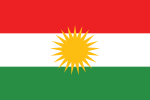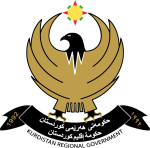Kurdistan
| |||||||||||||||||||||||||||||||||||||||||
Kurdistan or the Kingdom of Kurdistan is a constitutional Monarchy formed by Blue87217 on the 17th of April 2024.
History
The deal at the 1921 Cairo Conference was a compromise that installed Faisal bin Hussein as King of Iraq on Aug. 23, 1921. However, the British betrayed King Faisal the following year in the Anglo-Iraqi Treaty of 1922 which left Iraq dependent and subservient to Britain on all foreign policy and domestic fiscal policy matters. The Iraqi politician refused to ratify the treaty until Britain threatened to not end the occupation if they didn't ratify it.
From the very start all serious political debate in Iraq revolved around ending the defacto "British mandate". Two Parlimentary opposition parties were born who's objectives were simply: ending the mandate and winning full independence.
The discovery of oil near Kirkuk in 1927 changed the political dynamics of the Anglo-Iraqi relationship. The oil gusher at Kirkuk was so massive that it destroyed the oil rigs and almost destroyed nearby Kirkuk. Only by quickly building levees was the town saved from being flooded by oil.
The 1922 treaty was renegotiated and signed on June 30, 1930 which granted Iraq much more independence and eventually led Iraq being allowed to enter the League of Nations on Oct. 3, 1932 as an independent nation.
However, the nation of Iraq was disfunctional from the very beginning. And that disfunction found a voice in the name Sheikh Mahmud Barzanji.
"In the steep hill of victory ahead of us, I expect unity from you and sacrifice from myself."
- Sheikh Mahmud Barzanji, the King of Kurdistan, 1918
During the war, Colonel Sir Arnold Wilson, the British Civil Commissioner in Iraq, told the encouraged the Kurdish people to rise up against the Ottomans. Wilson also told them that the British intention was to form an independent Kurdish country after the war.
It was the first of countless lies the Kurds would hear from the West.
Under the Treaty of Sevres, there was supposed to be an independent nation of Kurdistan. However, it was rejected by the Turkish republican movement, which put enough pressure on the British (including near open war) that they renegotiated, and ended up with the Treaty of Lausanne. Of course the Kurds were never part of these treaties.
Sheikh Mahmud Barzanji was made the governor of Suleimaniya on behalf of the British in November of 1918. Most Kurdish tribes accepted this. However, when the Kurds approached Wilson a month later asking for certain rights for the Kurdish people they were ignored.
Mahmud took the initiative and declared himself king of an independent Kurdish state in May 1919. He led the first (of many) Kurdish revolt and quickly pushed the small British contingent out of Suleimaniya and its surroundings. Among his many supporters was 16-year old Mustafa Barzani, a future Kurdish revolutionary.
An army of 1,500 Kurds engaged in a fierce battle with British forces in the Baziyan region, near Sulaimaniya. "Shari Darbandi Baziyan" is a national pride in the Kurdish history. Unsurprisingly, Kurdish forces were defeated by the superior numbers and technology of the British force, and ‘The great Sheikh was injured and arrested; he was then exiled to India.’ This treatment of a religious leader was seen as a great insult to the Muslim Kurds, and left a deep mistrust between Kurds and Britain for generations to come.
The Kurds refused to acknowledge their annexation by Iraq and didn't take part in the July 1921 referendum to choose Faisal as monarch of Iraq. The revolt never completely ended despite the British victory.
In 1922 the brother of Mahmoud Barzanji, Sheikh Qadyir, began getting aid from Turkey to fight the British and the fighting began to get serious. The British, afraid that Kurdistan might fall into the hands of the Turks, decided to bring Sheikh Mamoud back from exile and appoint him as governor again. Again Mahmoud Barzanji defied the British and proclaimed himself king on 18 November 1922. In 1923 the British recognized Kurdish autonomy.
However, that didn't stop the war, and in 1924, with the help of the RAF, the British finally defeated the Kurds and Kurdistan was once again annexed into Iraq.
Mahmoud Barzanji escaped with some of his forces into the mountains along the Iranian border where he once again lived in exile. But by 1930 the British troops had long since left and Mahmoud forces crept back into Kurdistan. In September 1930 the third Kurdish revolt began, aided by Mustafa Barzani and his brother Ahmad.
By March of 1931 the RAF was once again bombing Kurdish villages, but this time with a newly formed Iraqi army supporting it. Unable to defend themselves from the aerial bombardment, Barzanji retreated to Persia and surrendered on 13 May 1931. Sheikh Mahmud was captured and sent into prison exile in southern Iraq, the first of many Kurds.

